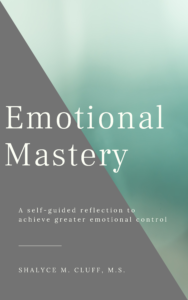Emotional Mastery
Can you control your emotions?
This is the question I ask my psychology students for their semester assignment in the Introduction to Psychology class I teach. As students have submitted their assignments semester after semester and year after year, the resounding answer was, “Yes!” I’ve had students who struggled with an issue for years, and after this assignment had a breakthrough, and were able to gain a greater handle on the situation. Reading the positive responses, time and time again, I realized that this “assignment” could benefit any individual in their daily life, including me.
Our Emotional Life
Emotions are a driving force in our life experience. The choices we make, how we behave, and our view of the world are all affected by the emotions we are feeling. However, little attention is focused on how emotions occur. Though the discussion of emotional intelligence is more common today, we still fall short in both teaching and understanding our emotions, the role they play, and how we can effectively manage emotions to increase our quality of life.
It’s Hard to Believe Emotions Can be Mastered
Emotions seem natural. They seem beyond our control and to occur through no choice of our own, but that’s not true. Emotions stem from experiences that occur as well as our view of that experience. If two people receive a phone call and one individual anticipates bad news, while the other anticipates good news, they are guiding their emotions through their thoughts, which will reflect on how they feel about the phone call. The thoughts we entertain are the basis for our emotional experience.
Emotions can be mastered, but it is not easy. It requires us to override previously programmed automatic responses and thought patterns. A healthy emotional life is perhaps the most craved and most elusive possession today. This guide will help you work towards a healthy emotional life through the simple daily practice outlined.
Why it Works
Emotions are powerful. While they sometimes seem beyond our control, as we begin to gain a greater awareness of our emotions, the events that lead to them, the thought process that is involved with them and the way they are elicited, we can begin to make changes to our environment and the way we think which will help us alter the automatic response that is associated with our emotional experience. While many emotional responses are a learned response from past experiences, we can change our learned response to be more inline with what we would like our emotions to be.
One Last Thing
This doesn’t mean we eliminate so called “negative” emotions. Even emotions such as sadness and anger have a place. This is a process meant to learn mastery so that when you feel sadness or anger, it serves a higher purpose and when you feel happy and content, you have come to be so through your personal choice. Emotional mastery allows you to take any emotion that is having a detrimental effect in your life and harness the power to change the impact it has.
Check out my emotional tracking workbook on Amazon.





Well written and good insight. A lot to think about and process. I’ve always been interested in why people or myself react to certain situations based on emotions at the time. Thanks for the article and potential work sheets!
Thank you. It is interesting stuff for sure. There always seems to be more to learn.